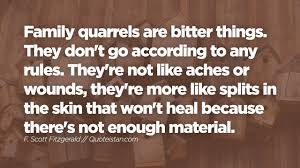
Narcissist’s actions rarely match their words, they are inconsistent and change their minds, opinions and dreams/desires on a regular basis. For those who are involved with narcissists it can be very frustrating to try to work out where they are coming from, you keep trying to make sense of their behaviour and project “sense” onto them (even if it seems far fetched). You are invested in making their behaviour seem “normal” so you try to “fill in the gaps”. However, the gaps in their behaviour will become too big to fill and you will realise that everything that you do for or with a narcissist is in vain.
Their complete lack of integrity and consistency means that you realise that you cannot trust or depend on them in any way. They make and break promises without remorse or feeling guilty and then they will turn around and blame you for the fact that they broke their promises. So, you lose trust in them, but we feel guilty about that because that is not how you “should” view your family members, partner or friend, so there must be something wrong with you. It is frustrating, self-depreciating, exhausting and you have been emotionally abused, it is not your fault, you just didn’t think that anyone could be this way. Not knowing that some people can behave this way leads to further abuse, such as.
- You feel responsible for cleaning up their mess
- You will clean up their mess without complaining or pointing out the error of their ways.
- You try to show what the problem is by setting an example.
The narcissist is preying on you at this stage, they will try to make you feel that it is you who is crazy and is being irrational
- The narcissist does not want to be accountable or cooperative as they see it as a loss of power and control and that which sets them apart as being special and more entitled than the rest of the human race. They will very often tell you that they deserve special treatment due to their wonderful talents, beauty and intelligence. Because what they say is so exaggerated and extreme, you might think that they are joking, they are not, they are very serious.
- If you expect a narcissist to do something they will be twice as elusive because they see “being expected to” as being taken “advantage of”, so helping with house work or working as part of a team (unless they are the leader) is completely beneath them as they see that they deserve special treatment and mundane tasks are for lesser mortals to execute.
The word integrity means being whole, entire and undiminished. This is the antithesis of what a narcissist is. They are confused, fractured, have different sets of rules for themselves and everyone else and different behaviour depending on who they are talking to. This means that they have very little self-awareness of their thinking and behaviour so they can do anything they want without feeling bad about it.
- If you come from a narcissistic family of origin this type of behaviour can feel “normal” because you have kept making excuses for those who are supposed to love you and we all have a deeply ingrained desire for love and intimacy.
- You are a bit innocent and you cannot believe that someone would treat another person in this way. You feel like there must be a more complex dynamic that you are just missing it.
- You try to justify their behaviour to yourself with self-talk such as “there must have been some reason for them to behave that way”, “if they feel that strongly about it” they don’t feel that strongly about “it”, they feel strongly about getting their own way.
- The narcissist has massive gaps in their psyche so they cannot understand the effect that their behaviour has on an integral level, they judge everything on their own limited emotional landscape which is anger, envy, hurt and self -righteous indignation. Any expression of emotion that they manage to evoke in someone else is a win for them.




